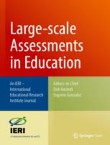2022 Citation Impact
3.1 - 2-year Impact Factor
4.0 - 5-year Impact Factor
1.623 - SNIP (Source Normalized Impact per Paper)
0.996 - SJR (SCImago Journal Rank)
2023 Speed
31 days submission to first editorial decision for all manuscripts (Median)
324 days submission to accept (Median)
2023 Usage
418,474 downloads
133 Altmetric mentions
